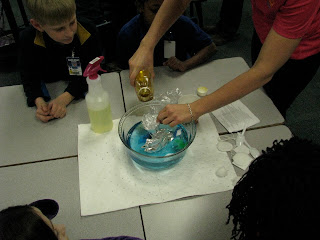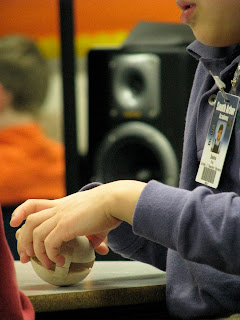Small groups of students had a bowl of tinted water, they constructed boats with tin foil, they filled those boats with cooking oil, then they experienced an oil spill when their boats tipped over.
They made observations about what happens to the oil (it gathers at the surface of the water), what happens to the plants and animals in their lake (they get covered in oil), and how well different techniques work to clean up the oil (string contains it, hydrophobic pads soak it up, soap washes it off).
They learned that some bugs (microbes) even eat oil, that it's important to preserve complete ecosystems, and that environmental engineers wear "personal protective equipment" when working with oil spills. The engineers left the students with a fun and challenging wooden sphere puzzle and the desire to protect our waterways from oil spills.
Later that week, the students reported on their oil spill experience using the scientific method.
Thanks to Ms. Stevens and the team of environmental engineers for facilitating this memorable hands-on lesson for these 3rd graders!
Career Awareness Bonus (jobs related to this post): engineer, environmental engineer, chemical engineer, 3rd grade teacher, oil refinery manager, ship captain, marine biologist, veterinarian, park ranger










No comments:
Post a Comment